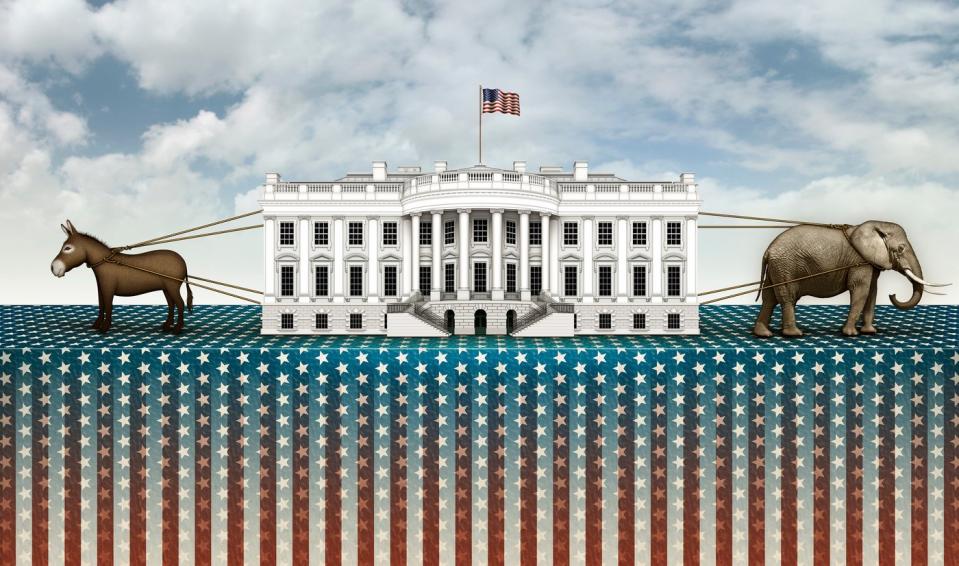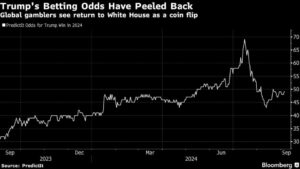Will Kamala Harris or Donald Trump Be Better for the Economy? Here’s What 1 Top Wall Street Analyst Says

As the U.S. economy goes, so goes the stock market. At least, that’s generally the case. When the economy is strong, corporate earnings tend to rise. And when earnings rise, stocks usually move higher.
With the presidential election just around the corner, many investors are understandably interested in how the policies of the two major candidates might affect the economy. Will Kamala Harris or Donald Trump be better for the economy? Here’s what one top Wall Street analyst says.

The clear winner, according to Goldman Sachs
Goldman Sachs (NYSE: GS) is a financial services giant with operations spanning the globe. It’s a leading investment bank and offers asset and wealth management services. Because of the intersection between politics and its business, the firm recently evaluated the potential impact of Harris’ and Trump’s proposed economic policies.
There’s a clear winner between the two based on how their policies would affect the U.S. economy, in Goldman Sachs’ view. It’s Kamala Harris.
The Wall Street firm projects that under a Harris administration with Democratic control of Congress, jobs would grow by around 10,000 per month higher than if Trump wins with a divided Congress. A Harris win would create 30,000 more jobs per month compared to a sweep where Trump becomes president and the GOP controls both the Senate and the House of Representatives.
Goldman Sachs analysts also predicted that Trump’s economic plans would reduce gross domestic product (GDP) by around 0.5% in the second half of 2025. However, they think this negative impact to GDP would diminish beginning in 2026.
Why the Wall Street firm views Harris’ policies more favorably
Vice President Harris has proposed economic policies including expanded child tax credits, bans on price gouging, tax incentives for first-time homebuyers, and an increase in the corporate tax rate from 21% to 28%. She also recently called for raising the long-term capital gains tax rate to 28% for Americans who earn $1 million or more and giving up to $50,000 in tax deductions for new small businesses.
Former President Trump wants to reduce corporate tax rates to 15%. He proposes tariffs of at least 10% on all imports with tariffs of 60% on imports from China. Trump also plans to reduce government regulations to help businesses. His idea of a massive deportation of illegal immigrants could have an economic impact as well.
Goldman Sachs likes Harris’ proposed spending initiatives and tax credits for the middle class. The firm projects these plans would “slightly more than offset investment due to higher corporate tax rates.” The result, in Goldman Sachs’ view, is that a Harris administration with a Democratic Congress would boost GDP growth a little in 2025 and 2026.
The Wall Street firm has a negative take on Trump’s economic proposals, however. Goldman Sachs analysts wrote to investors earlier this week, “We estimate that if Trump wins in a sweep or with [divided] government, the hit to growth from tariffs and tighter immigration policy would outweigh the positive fiscal impulse.”
What’s the potential impact on investors?
Not everyone agrees with Goldman Sachs’ outlook. The Trump campaign responded to an inquiry from Bloomberg: “[T]hese Wall Street elites would be wise to review the record and acknowledge the shortcomings of their past work if they’d like their new forecast to be seen as credible.”
Unsurprisingly, the Harris campaign liked Goldman Sachs’ analysis. It released a statement saying, “Vice President Harris has a positive vision to strengthen the economy by building up the middle class, cutting taxes and lowering costs for working families and small businesses, and creating opportunities for all Americans to get ahead.”
What’s the potential impact on investors if Goldman Sachs’ take is right? The easy answer is that it depends on who wins in November. However, the stock market has risen in the past during both Democratic and Republican administrations. For long-term investors, the occupant of the Oval Office over the next four years won’t matter nearly as much as the quality of the stocks they buy and how long they own those stocks.
Should you invest $1,000 in Goldman Sachs Group right now?
Before you buy stock in Goldman Sachs Group, consider this:
The Motley Fool Stock Advisor analyst team just identified what they believe are the 10 best stocks for investors to buy now… and Goldman Sachs Group wasn’t one of them. The 10 stocks that made the cut could produce monster returns in the coming years.
Consider when Nvidia made this list on April 15, 2005… if you invested $1,000 at the time of our recommendation, you’d have $656,938!*
Stock Advisor provides investors with an easy-to-follow blueprint for success, including guidance on building a portfolio, regular updates from analysts, and two new stock picks each month. The Stock Advisor service has more than quadrupled the return of S&P 500 since 2002*.
*Stock Advisor returns as of September 3, 2024
Keith Speights has no position in any of the stocks mentioned. The Motley Fool has positions in and recommends Goldman Sachs Group. The Motley Fool has a disclosure policy.
Will Kamala Harris or Donald Trump Be Better for the Economy? Here’s What 1 Top Wall Street Analyst Says was originally published by The Motley Fool








